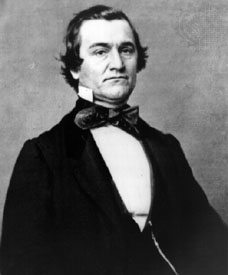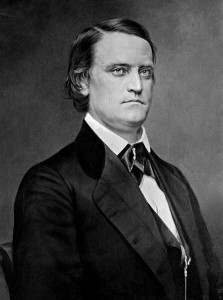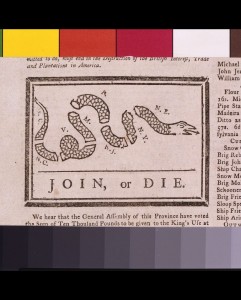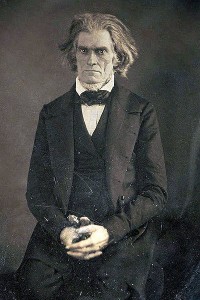William Lowndes Yancey was a well-known Fire-Eater. Fire-Eaters were a group of Southerners who strongly supported states rights, slavery and the resumption of the slave trade, and eventually secession. On October 23, 1860 (about two weeks before the presidential election) Yancey gave a speech in Lexington, Kentucky in front of four thousand people. The New-York Times. reported on the speech in its issue of October 27, 1860. Pontiac, The Times correspondent sort of played stenographer and wrote up the basic ideas from Yancey’s speech. He pretty much had to condense the speech – Yancey “spoke for two hours and a quarter with much energy and power”.
Here are some excerpts from Pontiac’s report:
Mr. YANCEY began by stating the object of his ex-
tensive speech-making. It is, ostensibly, to bring
about such a union of the Breckinridge, Bell and
Douglas parties as will overcome the unconstitutional ,
sectional, Abolition and Disunion Party of the North,
and thus rescue the Constitution and the Union. He
has no personal ambition, no desire for place. For
many years he has pursued the even tenor of his way
in the paths of private life, and nothing but the perils
to the Constitutional basis of our Government has
now brought him out. He would assail or abuse no-
body, but he will defend himself and his cause against
those who aim to stab the Constitution through its
breast.
Slavery is the agitating and all-controlling question
of American parties. It is a living, practical , trans-
cendent issue. The entirely sectional, grasping and
rapacious Republican Party, which is very likely to
win, is for nullifying the Fugitive Slave law, and for
prohibiting Slavery in the Territories and in the Dis-
trict of Columbia, and the Slave-trade between the
States! Twelve of their fifteen or more States have
passed laws nullifying the Fugitive Slave act . Ag-
gression on Slavery is the Republicans’ philosophy
and policy. This is so, though slaveholding is a con-
stitutional right, entitled to recognition and protection
from all branches of the Government .The Breckinridge Party has some appreciation
of the inestimable dignity and importance of Slavery.
Nothing but extermination can remove or get rid of
the 4,000,000 slaves in the South. They are worth,
according to Virginia prices, $2,800,000,000.The Black-Republican cloud is hovering over OUT
border, ready to burst in thunder, lightning and tem-
pest upon us ! What shall be done?Mr. BRECKINRIDGE is the only contending and avail-
able candidate against Mr. LINCOLN. He is the only
strong man we have. He is the man to unite the
South and save the South! BELL has no chance of
carrying Tennessee; she will go against him by at
least 10,000. Mr. YANCEY believes that the chances
in Kentucky of “her honored and cherished son ”
are the best! Kentucky and Missouri are the only
doubtful Southern States; all the rest are sure for
BRECKINRIDGE! LINCOLN may get 16 States – DOUGLAS
will get nothing. PONTIAC.
As a matter of fact Kentucky did not go for its native son Breckinridge. Bell won Kentucky, Tennessee, and Virginia. I just noticed something else that points out the North’s dominance in the nation and in the war that was to come: The Wikipedia article about the 1860 Election
gave a recap of the popular vote. Seventy percent of the voters voted for either Lincoln or Douglas, the Northern Democrat.
My last post talked about the value of cotton and slaves to the southern economy. Here Yancey states that the market value of slaves is almost 3 billion dollars.
Another thing that struck me was Yancey’s discussion of nullification. History books tell us that the southern states were the nullifiers, but Yancey says that northern states nullified the Fugitive Slave Act. Could this be true?
Wikipedia to the rescue again. Several northern states passed Personal Liberty Laws in response to the Fugitive Slave Act. These laws put up roadblocks to effective enforcement of the law without actually invoking the doctrine of nullification. Encyclopedia.com has more information on this.
The relationship between the states and the federal government seems to be one of the major themes of U.S. history. At the signing of the Declaration of Independence Ben Franklin allegedly said: “We must, indeed, all hang together, or assuredly we shall all hang separately”. After the Revolutionary War the Constitutional Convention of 1787 tried to improve the Articles of Confederation, which had turned out to be too state-centric.
And on through the Civil war to the present day. This year the state of Arizona passed a law that the state said was intended to enforce the federal immigration laws that the U.S. government was not enforcing. Also this year, several state attorney generals are challenging the constitutionality of Obamacare.
What’s more, this week TOCWOC – A Civil War Blog featured an article with the provocative title, “Time for another John C. Calhoun?” and links to Tom Woods’ site and his article about state nullification.And it’s really not just an American phenomenon. One of the major ongoing stories in The Economist is the relationship of the member nations to the European Union. How much sovereignty is each nation willing to give up for the sake of the Union?
As always, it would be great to hear what you think. Thanks!





Pingback: Tweets that mention Fire-Eater Plays Lexington | Blue Gray Review -- Topsy.com
Pingback: William L. Yancey, Diplomat??? | Blue Gray Review